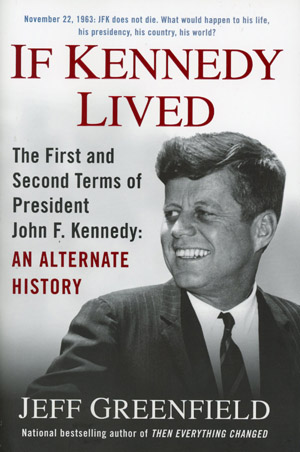
This is the cover of “If Kennedy Lived: The First and Second Terms of President John F. Kennedy: An Alternate History” by Jeff Greenfield. The book is reviewed by Eugene J. Fisher. (CNS)
“If Kennedy Lived: The First and Second Terms of President John F. Kennedy: An Alternate History” by Jeff Greenfield.
G.P. Putnam’s Sons (New York, 2013).
249 pp., $26.95.
I was in college and deeply involved in the civil rights movement of the early 1960s when President John F. Kennedy was assassinated Nov. 22, 1963, and I was in graduate school and deeply involved in the anti-war movement, working with Dorothy Day and others to protest the war in Vietnam during what would have been Kennedy’s second term.
When I worked for the U.S. Conference of Catholic Bishops, I got to know Sargent Shriver rather well, and through him I met a number of members of the extended Kennedy clan. I came away from these experiences with a great admiration for how their Catholic faith and values imbued their political vision and aspirations for our country. Jeff Greenfield’s “If Kennedy Lived,” a fascinating exercise in a historical “what if,” was thus a very personal exercise for me as a reader, and one I would recommend to anyone who wishes to understand better one of the most tumultuous and meaningful periods in American history since the Civil War.
Greenfield is a journalist who has won five Emmy Awards. He was an aide and speechwriter for Robert F. Kennedy and onetime New York Mayor John Lindsay. In this book, Greenfield probes what might have been if on that rainy day in Dallas the sun had not come out and the plastic “bubble” on the presidential car had not been removed. If it had stayed on, Greenfield plausibly posits, the shots that hit the president might have been serious, but not fatal.
[hotblock]
Kennedy was hardly, in his personal life, a saint, and Greenfield does not gloss this over. But he does not, to his credit, dwell on personal faults, but deals with the major issues of the time.
He shows how Kennedy might have pushed through voting rights and equality for those Americans whose families came to this country not as immigrants seeking a better way of life but tragically as slaves, forcibly sent into a system of segregation that was even in Kennedy’s time all too prevalent not only in the South, where slavery flourished, but in the North and West as well.
Greenfield narrates how a JFK who survived an assassin’s bullet, if only barely, might have acted to bring the American troops home from Vietnam, changing the course of American history.
The book is not perfect. Different readers may object to certain details. But his creation of Kennedy’s speeches in his re-election run and second inaugural address, as well as the humor-filled banter around the Kennedy dinner table, struck me was being well within the criterion of plausibility that Greenfield sets as his measure.
This is a book for anyone interested in American history, how it happened and how it might have happened “if.” Greenfield does not raise the issue, but one knowledgeable about Catholic history can also discern how the Second Vatican Council might have influenced Kennedy and, through him, America, for the better.
***
Fisher is a professor of theology at St. Leo University in Florida.
PREVIOUS: Washington cathedral, site of Kennedy funeral in ’63, is ‘holy ground’
NEXT: Dallas marks JFK assassination anniversary with prayers and solemnity


Please, I stopped reading at his great admiration for their Catholic faith and values.
50 years ago was the end of a virtuous America and the beginning of a new era. It would take more people like Snowden before the public opinion would begin to realize what is at stake today behind the facade of the media. It would take a few CIA agents that had the courage to neutralize one deviated branch of the CIA which is acting today independently from the US government and that remained loyal to a group of individuals who had the power to kill Kennedy on that fateful day. JFK assassination and 9/11 are two events that changed history and have CIA and Texas in common. Better yet, they have in common one notorious family from Texas. But how could the worst criminals in modern history, the Bush family, face justice as long as the media is so subservient and the public opinion could believe a story like the one of Osama Bin Laden? The CIA did not need to worry about Warren or 9/11 Commissions but how long will it take before a new and real investigation will answer questions like how building 7 fell on September 11 without being hit by any plane or other? More important than the past is the future and to get to know that it would be enough to ignore the media, connect the dots and observe one clear path that leaves no doubt.
http://www.wavevolution.org/en/humanwaves.html